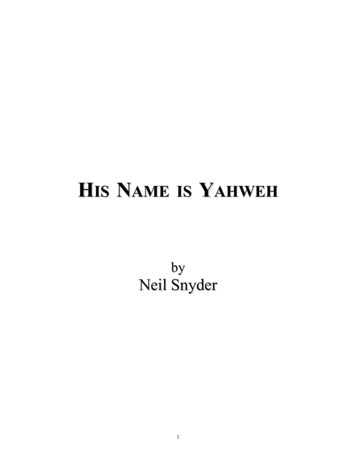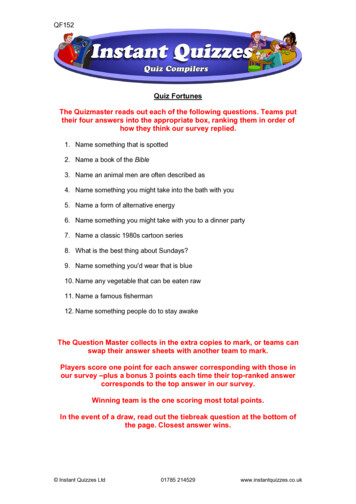
Transcription
HIS NAMEISYAHWEHbyNeil Snyder1
2006 by Neil H. Snyder. All rights reserved. No part of this book may be reproducedor transmitted in any form or by any means, electronic or mechanical, includingphotocopying, recording, or by any information storage and retrieval system withoutwritten permission from the copyright holder.Registration number, United States Copyright Office: TXu1-156-444Bible quotes in this book are from the New American Standard Bible unless otherwiseindicated. God’s personal Name, Yahweh, is used in this book instead of “the LORD,”“the Lord GOD,” or “LORD of hosts” as it is translated in the New American StandardBible, and the first letter in any word is capitalized if it refers to God, the Messiah, or HisName.Your comments are welcomed. To correspond with the author, please use the followingaddress:Dr. Neil H. Snyder100 Paradise CircleTownville, SC 296892
ContentsHIS NAME IS YAHWEHAcknowledgements4About the Author5Chapter 1God Said It and That Makes It So6Chapter 2HIS NAME IS YAHWEH15Chapter 3Yahweh Declares His Name to the World35Chapter 4Yahweh is Holy54Chapter 5Yahweh has a Human Form70Chapter 6Yahweh’s Covenants and Promises96Chapter 7Without Faith We Are Dead115Chapter 8The Messiah in the Old Testament140Chapter 9Jesus is Yahweh171Chapter 10Everyone Who Calls on the Name of YahwehWill be Saved191Chapter 11Conclusion207AppendixJesus Fulfilled the Messianic Prophecies218SelectedBibliography2273
AcknowledgementsThe members of my family were a constant source of inspiration as I worked on thisbook, and I am indebted to all of them: my wife Katie, my daughters Melanie andRebekah, my brother Craig, my mother and father Mary and Ed Snyder, my sister CarolLabarre, and my wife’s parents Dan and Sue Plaster. I love them will all my heart.Many other people assisted me, some of them without even knowing it: AndrewRoth, Sid Roth, Pat Parks, Charles Stewart, Ralph Motsinger, John Welborn, Ed Rose,Kay and Mac Snyder— two people Yahweh is using in amazing ways, Bill Shenkir, EliasAwad, Bernie Morin, Tony Crunk, Ann Rought and her mother-in-law Jean Rought, anda woman whose name I will not mention. She is the mother of one of my former Jewishstudents, and she read every chapter of this book while I was writing it. Her commentswere invaluable to me.I want to thank several of my former students who helped me: Macon Hubard, AllynDabkowski, Lindy Blevins, Josh Johnson, Kristin Braggins, Josh Paulson, Ed Deng,Lauren Franzel, Adrianne Walvoord, Kristin Rogus, Patricia Lopez, Dave Chattleton,Reece Hale, Lili Hyder, Devon Pearce, Key Richardson, Andy Jaspen, and JennyPhillips.Finally, I want to thank Noam Avraham. She is an Israeli girl who lived with mywife and me for several months in 2002. While Noam was with us, I was working onPowerPoint presentations to deliver the content of this book, and I was adding details tothe text that are critically important. She helped me by explaining the meanings of manyHebrew words that are not easily translated into English. She is like a daughter to mywife and me, and we love her very much.I know I failed to mention everyone who helped me, and I apologize to anyone I leftout. I am truly grateful to Yahweh for giving me so many people for support.Neil SnyderTownville, SC4
About the AuthorNeil Snyder earned a Ph.D. degree in strategic management from the University ofGeorgia in 1979 and taught leadership and strategy at the University of Virginia for 25years. He is the author of numerous books including Vision, Values & Courage (TheFree Press, 1994) and The Will to Lead (Irwin Professional Publishing, 1997), and he haspublished more than 100 articles and business case studies. Dr. Snyder retired from UVAin 2004, and currently he is the Ralph A. Beeton Professor Emeritus at the University ofVirginia.During his tenure at UVA, he served as Policy Advisor for Regulatory Reform toGovernor Charles S. Robb of Virginia (1982-1985), and he was co-chairman in 1985 andchairman in 1986 of the Governor’s Conference on Small Business in Virginia. In 1985,he received the Small Business Advocacy Award of the Virginia Chamber of Commerce.He served as deacon at Milledge Avenue Baptist Church in Athens, Georgia whileworking on his doctorate and at Crozet Baptist Church in Crozet, Virginia while teachingat the University of Virginia. Dr. Snyder serves on the boards for Sukkot Internationaland International Door of Hope.5
Chapter 1God Said It and That Makes It SoRecently, I heard a disturbing statistic. According to a Gallup poll taken in May2006, fewer than 30 percent of Americans believe the Bible is the Word of God.1 SinceGod gave us the Scriptures to direct our path toward Him, the fact that more than 70percent of the people in this so-called “Christian nation” say they do not believe HisWord is alarming.God is not an abstract idea or a theological concept. He is the Sovereign of theuniverse. To avoid any confusion, I want you to understand at the outset that I accept thetruth of the Bible without reservation or qualification. I make no apologies for standingon God’s Word, and my goal in this book is to show you what the Bible actually saysabout the Name of God—Yahweh.Yahweh is GodIt took me almost a decade to do the research required to write this book. I studiedHebrew and Greek, and I read ancient documents that few people have ever seen. I alsomade hundreds of presentations about the importance of God’s Name to groups rangingin size from 3 or 4 people to more than 500 people. All told, I have talked withthousands of people about this subject, and my personal experience has taught me aninvaluable lesson. We have a long way to go before the Christian communityunderstands what God said in the Scriptures about the importance of His ci 22885.6
It’s tragic that most Christians don’t know God’s Name and that He commanded us todeclare the Name “Yahweh” to the world. It may surprise you to discover that “Yahweh”is the only Name God told us to proclaim to the world! This is an irrefutable fact—a factyou will understand perfectly by the time you finish reading this book. Even more, mostChristians have no idea that Jesus is Yahweh and that we have salvation in the Name“Yahweh.” Think about it and let it sink in. Jesus is Yahweh—our only Savior!Occasionally, when Christians hear this message for the first time, they becomeindignant because they haven’t heard a preacher say it from the pulpit. I’m confused too.It’s difficult for me to understand why so many preachers don’t have a grip on theimportance of this message—especially since it comes straight from the Bible and it’srepeated so often in the Scriptures. A few years ago, I told a friend that God’s Name isYahweh and that Yahweh is the Name in which we have salvation. These are irrefutablefacts, yet my friend was visibly angry. With a harsh tone in his voice, he said, “Thatcan’t be true because if it were I would have heard it a long time ago.”My friend was more than 50 years old at the time, and he had attended churchregularly since he was a small boy. During more than five decades of attending church,he never heard God’s Name mentioned from the pulpit—not even once. Interestingly,my friend will tell you in a heartbeat that he is a Bible-believing Christian and that heattends a Bible-preaching church. That’s all the more reason to be confused.Given what God says in the Scriptures about His Name, how can so many Christiansfail to grasp its significance? Why do Bible scholars tolerate the longstanding traditionof replacing God’s Name in the Scriptures with titles that Yahweh never intended assubstitutes for His holy Name? Even more, why have preachers as a group not made a7
fuss about this editorial tradition? These are important questions that I hope you willponder as you read this book.The Name “Yahweh” is Concealed in the ScripturesIt’s regrettable that the Name “Yahweh” doesn’t appear even once in the text of thethree most popular Bible translations on the market today. The King James Bible, theNew American Standard Bible, and the New International Version leave God’s Name outcompletely, and they substitute the titles “LORD” and “GOD” where the Name “Yahweh”belongs in the Scriptures.There are two significant problems with this editorial tradition. First, “LORD” and“GOD” are titles—not names, and Yahweh commanded us to declare His Name to theworld. He never even hinted that we should declare His titles to the world.Second, the titles “lord” and “god” can be applied appropriately to wood, rock, ormetal, and Yahweh Himself refers to anything that has been fashioned into an idol forworship as either a “god” or a “lord.” In other words, these titles don’t distinguishbetween Yahweh and inanimate objects or false deities. Once more, Yahweh did not tellus to declare His titles to the world. He did command us to tell the world who He is byName.In the Old Testament, the Name “Yahweh” should appear where you see the phrase“the LORD” where all the letters in the word “LORD” are capitalized. It should alsoappear where you see the phrase “the Lord GOD” where all the letters in the word “GOD”are capitalized. Many times Yahweh’s Name is translated as “LORD of hosts” where allthe letters in the word “LORD” are capitalized. In Hebrew, this phrase is Yahweh8
Sabaoth, and it means “Yahweh Master of legions.” It refers to Yahweh as the SupremeSovereign in the universe—the ruler of everyone and everything including the forces ofnature.According to Charles Ryrie, author of Ryrie Study Bible, Yahweh’s Name appears inHebrew manuscripts of the Old Testament exactly 6,823 times.2 That number probablyseems large to you, and I hope it raises questions in your mind about why you haven’theard a lot about God’s Name in church. And we know this, too. The New Testament isloaded with direct quotes and paraphrased passages from the Old Testament and manytimes those Old Testament verses contain the words “LORD” and “GOD” in capital letters.The Name “Yahweh” belongs there, but it’s not always easy to identify where God’sName should be in the New Testament because most Bible translations don’t pay enoughattention to the case of the letters brought from the Old Testament to the New Testament.It makes sense to me that somewhere along the way in their studies of the Scripturesmost preachers would have picked up on all the commands in the Bible associated withGod’s Name and would have pointed them out to their congregations, but it hasn’thappened on a large scale, at least until now. The fact that so few preachers tell theircongregations about Yahweh by Name is troubling.The systematic removal of God’s Name from the Scriptures and from daily use byHis people has had serious repercussions. God tied His promises, His covenant, His Law,and salvation to His Name. Moreover, He commanded us to know His Name, to seek HisName, to bless His Name, and to share His Name with everyone. In fact, these areunambiguous commands that come straight from the Bible, but it is evident that most2Ryrie, Charles. Ryrie Study Bible Expanded Edition, Moody, 1995, p. 6.9
Christians simply read past them without giving it a second thought. It’s as if they thinkit doesn’t matter, even though Yahweh said it matters—a lot.There is only one person I can think of who has a fanatical interest in hidingYahweh’s Name (and the promises associated with it) from the human population. He isnone other than Satan himself. The Holy Spirit may have allowed him to do it, but Hecertainly did not condone it. You need to keep this fact in mind as you read this book.The Holy Spirit may permit Satan to lead us into gross errors, but that does not mean Heapproves of all our actions. Despite our disobedience where Yahweh’s Name isconcerned, He has blessed us as a testament to His own generosity, kindness, patience,and love, but now it is time for us to obey Yahweh.Try this experiment. When you read the Bible and see the phrase “the LORD,” insertthe Name “Yahweh;” when you see the phrase “LORD of hosts,” insert the Name“Yahweh Master of legions;” and when you see the phrase “the Lord GOD,” insert theName “Lord Yahweh.” These are accurate translations from Hebrew to English. If youmake these changes, you will see what God actually says in the Scriptures about HisName, and it will awaken you to insights that will amaze you, and maybe even shockyou. It will also help you to appreciate what God meant when He said,“In every place where I cause My Name to be remembered, I will come to you andbless you.”3Jesus is YahwehThis book presents what Yahweh said about Himself in the Bible, and it showsclearly that Yahweh identified Himself as the Messiah from the beginning. The Person43Exodus 20: 24.10
Christians call Jesus is Yahweh. For example, in Philippians 2: 9-11, the apostle Paulwas referring to the Name Yahweh when he said,“God bestowed on Him (Jesus) the Name which is above every name, that at theName of Jesus every knee should bow, of those who are in heaven and on earth, andunder the earth, and every tongue should confess that Jesus Christ is Lord, to theglory of God the Father.”5“Yahweh” is the Name God bestowed on Jesus; it is the Name that is above everyname; and it is the Name to which every knee will bow when He returns. Regrettably,most of the time, Paul didn’t reference the Old Testament when he quoted Scripture. Inthis instance, we know for a fact that Paul said God bestowed the Name “Yahweh” onJesus because he is paraphrasing Isaiah 45: 21-24 in Philippians 2: 9-11. This is whatYahweh told Isaiah:“AAnd there is no other God besides Me, a righteous God and a Savior; there is noneexcept Me. Turn to Me, and be saved, all the ends of the earth; for I am God, andthere is no other. I have sworn by Myself, the Word has gone forth from My mouthin righteousness and will not turn back, that to Me every knee will bow, every tonguewill swear allegiance, they will say of Me, ‘Only in Yahweh are righteousness andstrength.’ Men will come to Him and all who were angry with Him shall be put toshame.”6Jesus said the same thing a little differently in John chapter 17. Take a look at John17: 6, 11-12, and 26 and you can see for yourself:John 17: 6—“II have manifested Your Name to the men whom You gave Me out ofthe world .”John 17: 11-12—“ Holy Father, keep them in Your Name, the Name which youhave given Me, that they may be one even as We are. While I was with them, I waskeeping them in Your Name which you have given Me.”John 17: 26—“II have made Your Name known to them, and will make it known .”4In this book, I capitalize the first letter in the word “Person” if I am referring to God. As thepersonification and the manifestation of Yahweh, Jesus is the essence, substance, and occurrence ofYahweh’s divine nature. Thanks to Andrew Roth for recommending this clarification. Clearly, Jesus is noordinary person.5Philippians 2: 9-11. The italics, shadow, parentheses, and bold are mine.6Isaiah 45: 21-24. The italics, shadow, and bold are mine.11
In John 8: 58, Jesus said plainly that He is Yahweh: “Truly, truly, I say to you, beforeAbraham was born, I Am.”7 That’s about as clear as it gets. “I Am” is the definition ofthe Name Yahweh. Later, I’ll explain why He used the definition of the Name instead ofthe Name itself in John 8: 58.When Jesus was with us in Person 2000 years ago, the three most common names forboys in Israel were Yohanan (translated as Jonathan or John), Yacov (translated as Jacobor James), and Yeshua (Joshua in modern English but transliterated as “Jesus”). In otherwords, His Name was never Jesus. In fact, the Greek Name for Jesus is “Iesous,” and ithas been transliterated into many languages. “Jesus” is just the English transliteration ofHis Name. This is my point. The Messiah is called by many Names, but Yahweh is theonly Name God commanded us to declare to the world. Even more, Yahweh is the onlyName that distinguishes between God and anyone or anything else in existence.Yahweh is Our Only SaviorI think the most significant problem with leaving God’s Name out of the Scriptures isthe simple fact that we have one Savior, and His Name is Yahweh. Take a look at theseverses: “I, even I, am Yahweh, and there is no savior besides Me.”8 “And it will come about that whoever calls on the Name of Yahweh will besaved.”9In Acts 4: 12, Peter said, “ there is no other name under heaven that has been givenamong men by which we must be saved.” By the time you finish reading this book,78John 8: 58.Isaiah 43:11.12
you’ll know that every verse in the New Testament referring to salvation either makesdirect reference to the Name “Yahweh” or it alludes to the Name “Yahweh.” In reality,the Scriptures make it clear that “everyone who calls on the Name of Yahweh will besaved.”10 This isn’t my opinion and I’m not speculating. That’s what the Bible says, andthe fact that most Christians have never heard this message before is shocking.I Will Use Footnotes Extensively as I Present My CaseIn this book, I won’t try to impress you with my wisdom and my opinions. I spentmy adult life as a university professor so you can rest assured that I have opinions butthey aren’t relevant to my message in this book. My sole purpose here is to show youwhat the Scriptures say about the Name “Yahweh.” I know this is a controversialmessage, but it’s true nonetheless, and you need to know it.I use footnotes extensively throughout this book to document my points so you willhave the opportunity to look at the Scriptures and compare what I say about them withthe words as they appear in the Bible. My reason for doing this is simple. I want you toknow that I minimized my interpretation of God’s Word, and in so doing, I let Yahwehspeak for Himself.Since some of the information in this book will be new to many of you, you should dowhat the Jewish people in Berea did when the apostle Paul preached the Gospel to them:“ they received the word with great eagerness, examining the Scriptures daily, to seewhether these things were so.”119Joel 2: 32, Acts 2: 21, and Romans 10: 13.Joel 2: 32, Acts 2: 21, and Romans 10: 13.11Acts 17: 11.1013
Please take your time as you read this book and examine what I say. I know this is acontroversial message because most Christians haven’t heard it before, but when youfinish reading this book, you will realize that the controversy should revolve around thefact that such an important message has been ignored for so long by so many Christianpeople—especially preachers. As I said, it’s troubling that so few Christians know theName of their God, and it’s time to do something about it.God Said It and that Makes It SoMany years ago, I heard a preacher deliver a sermon titled “God said it; I believe it;and that makes it so.” Later, I remember thinking that something was wrong with themessage, but I couldn’t put my finger on it. Then it dawned on me that God saying itmakes it so and that my believing what He said has no bearing on the truth of God’sWord. His Word would still be true even if no one believed Him.As you read this book, please resist the temptation to lay it aside when you see thingsfor the first time. The fact that some of the information in this book may be new to yousays a great deal about how powerful and well-entrenched Christian traditions are, but itsays absolutely nothing about the accuracy of the information I’m presenting. Take thetime to examine the Scriptures and determine if I have attempted to mislead you in anyway. When all is said and done, God’s Word is true no matter what anyone says.The Scriptures tell us beyond any shadow of a doubt that we have One God and thatHis Name is Yahweh. Yahweh is our Redeemer and our Savior, and the One mostChristians call Jesus is Yahweh.14
Chapter 2HIS NAME IS YAHWEHYahweh is God’s personal Name, or His Divine Name. Yahweh is called theTetragrammaton,12 or four-letter word, because it has four letters in Hebrew. OrthodoxJews won’t say Yahweh. Instead, they say HASHEM which is a Hebrew word that means“The Name.” Also, Yahweh is called the Ineffable Name, or the unspeakable Name, butGod’s Name is not unspeakable! In fact, according to the Bible, Yahweh commanded usto tell the world who He is by Name. Make no mistake. Not declaring God’s Name is anact of disobedience, and it is wrong.Yahweh Means “I AM”Yahweh means I was, I am, and I will be,13 and “I AM” is one of His Names. “I AM”is also the definition of His Name. God’s Name sets Him apart by distinguishingbetween Him and anything or anyone else. When Moses asked Yahweh to tell him HisName so he could let the Children of Israel know who sent him to lead them out ofEgypt, God said, “I AM WHO I AM; thus you shall say to the sons of Israel, ‘I AM hassent me to you.’”14 Then immediately He added this command:“Say to the Israelites, ‘YYahweh, the God of your fathers—the God of Abraham, theGod of Isaac, and the God of Jacob—has sent me to you.’ This (Yahweh) is MyName forever, the Name by which I am to be remembered from generation togeneration.”1512Kohlenberger, John III, The Interlinear NIV Hebrew-English Old Testament, Zondervan PublishingHouse, Grand Rapids, Michigan, 1987, p. xxxv.13Scherman, Rabbi Nosson, The Stone Edition Tanach, The ArtScroll Series , Mesorah Publications,Brooklyn, New York, 1996, p. xxv.14Exodus 3: 14.15Exodus 3: 15 from the New International Version. The parentheses, bold, italics, and shadow are mine.15
Since “forever” means without end, it’s obvious that Yahweh didn’t intend for us tosubstitute titles for His Name in the Scriptures. Also, since He instructed Moses to tellthe Children of Israel to remember Him by the Name Yahweh “from generation togeneration,” it’s crystal clear that Yahweh wants us to know His Name, to call on Him byName, and to tell the world about Him by Name.The Correct Pronunciation of God’s NameSome people believe that the correct pronunciation of God’s Name was lost, butaccording to the Encyclopedia Judaica, that’s not so.16 However, because people use itso infrequently, the correct way to pronounce God’s Name remains a source ofconsiderable debate.Many people believe that all the letters in Yahweh’s Name are consonants, but that isnot the case either. In fact, each letter in His Name is a vowel-consonant or semivowel.17The Hebrew spelling of Yahweh, yod-hey-vav-hey, appears below. Since Hebrew readsright to left, “yod” is the letter on the far right: יהוה Most Bible scholars and Hebrew linguists believe that “Yahweh” is the correct way topronounce God’s Name.18 The Y-a-h in His Name sounds like “Yah,” and the w-e-h in16Encyclopedia Judaica Jerusalem, vol. 7, Keter Publishing House, Jerusalem, Israel, the MacmillianCompany, Jerusalem, 1972, p. 680.17Weingreen, J.A. Practical Grammar for Classical Hebrew, Clarendon Press, 1939, pp. 6-7; Harris, R.Laird. Introductory Hebrew Grammar, Wm. B. Eerdmans Publishing Company, Michigan, 4th Edition,1955, p. 16; Marks, John H. and Rogers, Virgil M. A Beginner’s Handbook to Biblical Hebrew, Abingdon,Nashville, 1958, p. 7; and Horowitz, Edward. How the Hebrew Language Grew, Jewish EducationCommittee Press, 1960, pp. 333f.18If you would like to know more about the correct pronunciation of God’s Name, refer to theEncyclopedia Judaica, The Interpreter’s Dictionary of the Bible, Unger’s Bible Dictionary, The Jewish16
His Name sounds like “way.” That said, considerable debate persists about whether toenunciate the second syllable in God’s Name with a “v” sound or with a “w” sound, butcompelling evidence proves that the “w” sound is correct.19God’s Name is Not JehovahBetween the years 500 A.D. and 1000 A.D., vowel markings were invented andintroduced in the Hebrew language. To prevent Jewish people from accidentally sayingYahweh, the rabbis decided to place the vowel markings for the word “Adonai” (whichmeans lord) on the Name “Yahweh.” That produced a word with this sound: YeHoVah.20In 1520 A.D., a Bible scholar named Galatinus21 mistakenly called God by the name“Jehovah,”22 and in 1611 A.D., the translators of the original King James Bible explainedin a footnote that God’s Name is Jehovah. That’s why so many people today believe thatGod’s Name is Jehovah.23 Of course, they’re wrong, but most of them know only whatthey have been told, and they have been given incorrect information.Encyclopedia (Volume 12), the Encarta Encyclopedia, or Clover, R. The Sacred Name Volume I ThirdEdition, Qadesh La Yahweh Press, Garden Grove, California, 2002, chapter 9.19Encyclopedia Judaica, The Interpreter’s Dictionary of the Bible, Unger’s Bible Dictionary, The JewishEncyclopedia (Volume 12), the Encarta Encyclopedia, or Clover, R. The Sacred Name Volume I ThirdEdition, Qadesh La Yahweh Press, Garden Grove, California, 2002, chapter 9.20Landman, Isaac, ed. Universal Jewish Encyclopedia. 10 vols. The Universal Jewish Encyclopedia, Inc.New York, 1941, vol. 5, p. 7.21According to The Jewish Encyclopedia (Singer, Isadore, ed. 12 vols. KTAV Publishing House, Inc.,1964, vol. 7, p. 88), Galatinus was the confessor for Pope Leo the 10th.22Many, if not most, Bible scholars believe Galatinus was the person responsible for interpreting the Name“Yahweh” incorrectly as Jehovah. However, there is some controversy about this question. No matter whomade this mistake, we know the name Jehovah did not come into use until at least the 1400s A.D.23Kohlenberger, John III, The Interlinear NIV Hebrew-English Old Testament, Zondervan PublishingHouse, Grand Rapids, Michigan, 1987, p. xviii.17
Yahweh Commanded Us to Declare His Name to the WorldIn this book, as a rule I avoid criticizing any Bible translation. Clearly, translatingfrom one language to another is difficult since words may have multiple meanings andbecause colloquial expressions can change the natural meanings of words. However, inthis and in one other instance I’ll make an exception to my rule.The New American Standard Bible translates Genesis 4: 26 in the following way:“To Seth, to him also a son was born; and he called his name Enosh. Then men beganto call upon the Name of Yahweh.”24The King James Version and the New International Version differ only slightly fromthe NAS translation. However, The Septuagint Tanach (a version of the Tanach, or theJewish Old Testament, that was translated from Hebrew to Greek in 285 B.C. by a teamof 70 rabbis) and The New Jerusalem Bible tell us in Genesis 4: 26 that Enosh (not menas the NAS, KJV, and NIV suggest) was the first person in history “to invoke the Name ofYahweh.”25Below is a literal translation of the Hebrew in Genesis 4: 26:“And to Seth also was born a son, and he called his name Enosh. Then he (Enosh)began to call on the Name of Yahweh.”26The Hebrew word translated in this verse as “to call” is qara (kaw-raw’). It means tocall upon, to cry unto, or to proclaim. Obviously, Yahweh had a reason for including thisinformation in the Bible. He wanted us to know who invoked His Name the first timeand when he did it.24Genesis 4: 26.Genesis 4: 26 from The New Jerusalem Bible.26Genesis 4: 26 in The Interlinear NIV Hebrew-English Old Testament by John Kohlenberger, III. Theparentheses are mine.2518
Clearly, this verse in Genesis challenges the Jewish tradition forbidding the use ofGod’s Name, and it should raise serious questions about the legitimacy of that tradition.In spite of this, in The Stone Edition Tanach, The ArtScroll Series , a highly regardedversion of the Tanach, Rabbi Nosson Scherman translates Genesis 4: 26 in the followingway:“And as for Seth, to him also a son was born, and he named him Enosh. Then to callin the Name of HASHEM (Yahweh) became profaned.”27Rabbi Scherman’s translation of Genesis 4: 26 contradicts most Bible translations onthe market today, and it also disagrees with The Septuagint Tanach. Moreover, histranslation is internally inconsistent because the Psalms, the prophets, and the Torah thathe translates make it perfectly clear that Yahweh commanded us to declare His Name tothe world.I bring this up to make a critical point. It is dangerous and irresponsible tomistranslate God’s Word deliberately in an attempt to make it comply with our traditions.If God’s Word contradicts our traditions, then we should abandon our traditions.Yahweh will not give anyone permission to alter the plain meaning of His Word.God forbids the misuse of His Name or the use of it in a deceitful or duplicitousmanner. In his translation of Genesis 4: 26, Rabbi Scherman has distorted the truemeaning of God’s Word to make it comply with a Jewish tradition that contradicts HisWord. Jewish people need to know this, and Rabbi Scherman should correct his error!I used strong words in criticizing Rabbi Scherman’s translation of Genesis 4: 26, andlater you will see that I used strong words to criticize his translation of Proverbs 30: 4.Thus, I felt compelled to let him read what I said about his work before publishing this19
book. I telephoned him and asked him if he would read the sections of this book that arecritical of his work, and he agreed. I mailed him the manuscript for HIS NAME ISYAHWEH and identified the sections he should read. One week later, I received thisresponse from him:“My translation is based on Talmudic and Rabbinic sources going back hundreds—indeed, according to our faith—thousands of years. Judaism rejects your contentionthat the recipients of the Torah doctored its meaning, which pre-dates the CommonEra.”28Rabbi Scherman did not challenge my interpretation of the Hebrew words used inGenesis 4: 26 and Proverbs 30: 4. Instead, he defended his translation by referencing“Talmudic and Rabbinic sources” that interpret the Tanach differently. Later, I will showthat these non-Scriptural sources have been the source of much difficulty for the Jewishpeople. The Talmud, the Mishnah, and other non-Scriptural sources present and discussJudaic laws and traditions, many of which defy Yahweh’s
ponder as you read this book. The Name “Yahweh” is Concealed in the Scriptures It’s regrettable that the Name “Yahweh” doesn’t appear even once in the text of the three most popular Bible translations on the market today. The King James Bible, the New American Standard Bible, and the New International Version leave God’s Name outFile Size: 797KBPage Count: 234










